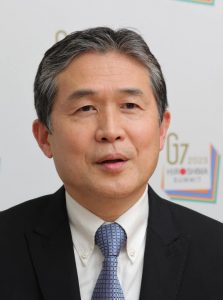Hiroshima Summit, May 19-21: Three months to go
Feb. 19, 2023
Masashi Mizobuchi, 57, Deputy Secretary-General for G7 Hiroshima Summit, Ministry of Foreign Affairs, originally from Minami Ward, Hiroshima
Convey to the world how Hiroshima recovered from atomic bombing
by Koji Higuchi, Staff Writer
The Summit of The Group of Seven (G7) industrialized nations will open in Hiroshima on May 19, three months from now. Masashi Mizobuchi, 57, a native of Minami Ward, Hiroshima, is deputy secretary general of the G7 Hiroshima Summit Secretariat for the Ministry of Foreign Affairs. The Chugoku Shimbun interviewed Mr. Mizobuchi, who played key roles in a total of four summits held in Japan since the 1993 Tokyo Summit, regarding the significance of holding the summit in the A-bombed city for the first time in history.
What do you think of the Hiroshima Summit based on your experience as an official of the Ministry of Foreign Affairs involved in the Tokyo, Okinawa, Toyako (Hokkaido), and Ise-Shima (Mie Prefecture) summits?
Hiroshima is the first city in the world to experience damage caused by a nuclear weapon and has recovered from it. In the past, it was said “nothing would grow in Hiroshima for 75 years,” but media from Japan and abroad will gather in this city to cover the words and deeds of the leaders of the countries. When this event gets worldwide coverage, the effect will be profound. As Prime Minister Fumio Kishida said, Hiroshima is the most appropriate place from which to send a message of peace. As Russia’s invasion of Ukraine drags on, it is incalculably significant that the leaders of the United States, the United Kingdom, and France, all of which possess nuclear weapons, acquaint themselves with the horrors of the atomic bombing.
The Japanese government is planning to have the leaders of these countries visit the Hiroshima Peace Memorial Museum in Naka Ward, and is also exploring the possibility of them meeting with A-bomb survivors.
The prime minister has an ardent desire to realize this. How will they fit into the tight schedule? We are giving consideration to both the museum tour and the meeting.
How will you involve local people?
I would like them to participate in as many aspects of the summit as possible, including related events. Making the summit an impressive event for many people is the key for it to be talked about long into the future. I hope young people will take this opportunity to learn once again about the reality of the atomic bombing of their hometown, and that it will be a catalyst for them to become interested in international affairs.
How big do you think the economic benefits from hosting the summit will be?
The economic effect of this summit will be greater than the estimate for the Ise-Shima Summit (560 billion yen). In addition to attracting more tourists and inviting more international conferences, it will be greatly effective in promoting local foodstuffs used for the event’s meals. The Hiroshima Summit prefectural council (a local public-private organization) has provided us with a list of some 1,300 products from the prefecture, including agricultural produce, processed foods, and locally brewed sake, and we are working on a plan to make the most of them.
Masashi Mizobuchi
Born in 1965. A classmate of Hiroshima Governor Hidehiko Yuzaki’s at a high school affiliated with Hiroshima University. Graduated from the Faculty of Law at Keio University. Joined the Ministry of Foreign Affairs in 1988 and served as deputy director general of the preparatory secretariat for the 2016 Ise-Shima Summit and the Foreign Ministers’ Meeting in Hiroshima. Assumed his current post last September after taking such posts as a consul at the Consulate General in New York.
(Originally published on February 19, 2023)








